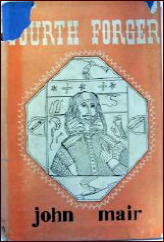Mon 23 Jun 2014
Reviewed by Dan Stumpf: JOHN MAIR – The Fourth Forger.
Posted by Steve under Reviews , True crime[2] Comments
JOHN MAIR – The Fourth Forger. Cobden Sanderson, UK, hardcover, 1938. The Macmillan Company,US, hardcover, 1939.
Several years ago on this blog I reviewed John Mair’s witty, off-beat thriller Never Come Back. Subsequent to that, I learned that Mair had written only one other book before his untimely death in WWII, this non-fiction study of a young gent named William Ireland and a controversy over “newly discovered†writings by William Shakespeare — a controversy that became a scandal that stirred London in the 1790s.
William Ireland was the son of Samuel Ireland, a prosperous collector and dealer in antiquities, and an avid Shakespeare enthusiast — he named his first son William, didn’t he? Every evening Samuel read to his children from the Bard, and this undoubtedly had an influence on William, but not so much as his father’s near-total indifference to him.
Samuel casually dismissed his son as dull and stupid (which for a long time supported the case for the Shakespeare Forgeries, as William was considered totally incapable of writing them) and placed him as apprentice to a legal office where William found himself with little to do but sit in an office, surrounded all day by musty old parchments. Very old parchments.
Here’s where Mair’s genius as a writer comes to the fore: Without disparagement or bathos, he evokes young William’s frustration and (probable) desperate need for his father’s approval, a need that drove him to seek out a suitably old scrap of parchment, draft a minor legal document in suitably antiquarian ink, and forge Shakespeare’s signature on it. When he presented this to Dad, William finally got a morsel of parental approbation — which left him hungry for more.
You can probably anticipate the rest. William worked up a convincing (to his dad) cover story about a wealthy and conveniently anonymous benefactor who kept a steady trickle of “treasures†that grew ever more fabulous. There were other documents. Then letters. Then a Profession of Faith that “proved†Shakespeare was not Catholic. And on and on.
William’s father Samuel began showing these to friends, then to authorities on the Bard, and they met with acceptance and even adulation, particularly the Profession of Faith, because it seemed to say what everyone wanted to hear.
Flushed with success and his father’s long-withheld esteem, and convinced of his own genius, William went to the next step: An original manuscript of King Lear in the author’s own hand, differing from the original only in being more attuned to contemporary tastes.
Needless to say, it was met by a public overjoyed to see that the writer they idolized actually catered to their own standards, and that anything objectionable must have been put there by later, inferior hands. Heady with success, William rushed into his next “discoveryâ€: a lost play titled Vortigern.
All this while of course, there were doubters. And William’s success/excess only made his work a larger target for analysis and debunking. Again, Mair does a fine job evoking the characters of the men who were actually right about the spurious nature of William Ireland’s Shakespeare Papers, but who were also mostly motivated by their own self-interest or idiosyncrasies. At the same time, he tells an intriguing and often poignant story of his father’s growing desperation as friends, fans and a fortune slipped from his grasp — all because of a son he publicly scorned.
This story could have been duller than ditchwater, but author Mair imparts his own fluid narrative style and smart-ass sense of humor to liven it up delightfully. To take just on example, at one point the Poet Laureate of England enters the picture, a poet-magistrate named Henry James Pye, who had been of some service to the crown, whom Mair describes: “…the verse that he wrote in his leisure hours could not detract from his numerous public services…. [as Poet Laureate] Pye did his poetic duty to the public with the same remorseless competence as he administered justice to criminals. From his appointment in 1790 to his death twenty years later he never ceased to write verse and never began to write poetry.â€
Writing like this makes The Fourth Forger a pleasure to read, and I followed this account of scandal and hurt feelings avidly to the end. You may too.

June 23rd, 2014 at 4:56 pm
Here’s Wikipedia’s take on the whole affair:
http://en.wikipedia.org/wiki/Ireland_Shakespeare_forgeries
June 23rd, 2014 at 11:17 pm
It’s interesting to compare the actual Ireland to the protagonist of Mair’s novel. He seems to have had a clear taste for rogues. Makes me wish there were other novels on the same line.
Pye though is not to everyone’s taste.
I apologize deeply for that, but could not resist.